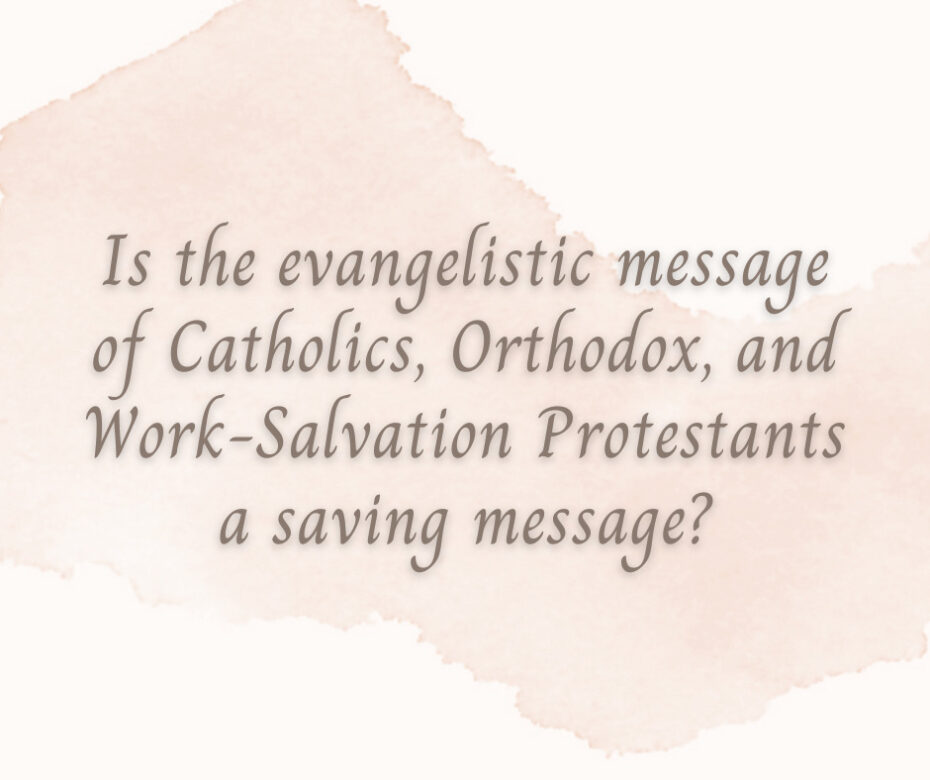In a recent blog I wrote that some in FG circles “suggest that Roman Catholics, Eastern Orthodox, and works salvation Protestants are all born again” (see here). Two speakers in a podcast jumped on the word all in that sentence. They thought that I was saying that some in FG circles teach that 100% of Catholics, Orthodox, and works-salvation Protestants are born again.
I was not suggesting that. The podcast speakers misunderstood my point.
Please read that sentence again. I think you will see how they misconstrued my meaning.
Let’s say that I said that Jews and Muslims and Christians all believe in monotheism. Would I mean that 100% of the people in those religions believe in monotheism? No. I would mean that all who believe the teachings of those religions believe in monotheism.
There are practicing Christians, Jews, and Muslims who are atheists. They may attend Easter services, Passover seders, and prayers in the mosque. But their reasons for doing so are other than their belief in God.i
In the same way, there are some Catholics, Orthodox, and works-salvation Protestants who do not believe the teachings of their church. I was not talking about people who do not believe what their church teaches.
By the way, the word all is often used in Scripture to refer to many or most, but not 100%. Matthew wrote, “When Herod the king heard this, he was troubled, and all Jerusalem with him” (Matt 2:3). Matthew did not mean that every man, woman, and child in Jerusalem was troubled by the words of the Magi.
Concerning John the Baptist, Matthew wrote, “Then Jerusalem, all Judea, and all the region around the Jordan went out to him” (Matt 3:5). Again, he is not saying that everyone in Jerusalem and the region of Judea came out to see and hear John the Baptist.
What I was saying is that some in FG circles say that Catholics, Orthodox, and works-salvation Protestants are all born again, assuming they believe the teachings of their church. In other words, some in Free Grace circles believe that the evangelist message of Catholics, Orthodox, and work-salvation Protestants is a saving message. While not everyone in those groups believe the evangelistic message of that group, most do, and that is who I was referring to.
Some in FG circles say that there are three things we must believe to be born again: the deity of Christ, the death of Christ for our sins, and His bodily resurrection. Well, Catholics, Orthodox, and Protestants all believe those truths, unless they do not believe the teaching of their group. If you believe those three things, then they say you are born again even if everlasting life is not on your radar and even if you believe you must maintain your salvation by persevering in good works.
We at GES believe that Catholics, Orthodox, and works-salvation Protestants are all unsaved, unless they believe in Jesus for everlasting life now or unless they believed that in the past. That is, we recognize that some in these groups believed in Jesus for everlasting life in the past (e.g., via Young Life, Cru, FCA, believing friends, etc.). And we recognize that some in these groups believe in Jesus for everlasting life now (contrary to their church’s teachings). In order to be born again, one must believe in Jesus for the promise of everlasting life, the gift of God. Once one believes, he is saved forever (OSAS). The doctrine of those three groups is antithetical to the free gift of everlasting life that cannot be lost. Therefore, their gospel is a false gospel (cf. Gal 1:6-9; 5:4).
Of course, some in FG circles think that it is heresy to say that a person is not born again until he believes that simply by faith in Jesus, he has irrevocable salvation/life/righteousness/future in the kingdom of God.
My point is that there are major differences among people who call themselves Free Grace.
I appreciate that the two podcast speakers were trying to be fair in the way they discussed what I wrote. However, they missed my point.
__________
i Reasons could include fear of social rejection (especially teens and young adults who fear crushing the dreams of their parents or losing the friendship of people in their church youth group), fear of financial losses from others in their religion who currently frequent their business, or simply the enjoyment of some of the ceremonies of their religion.


